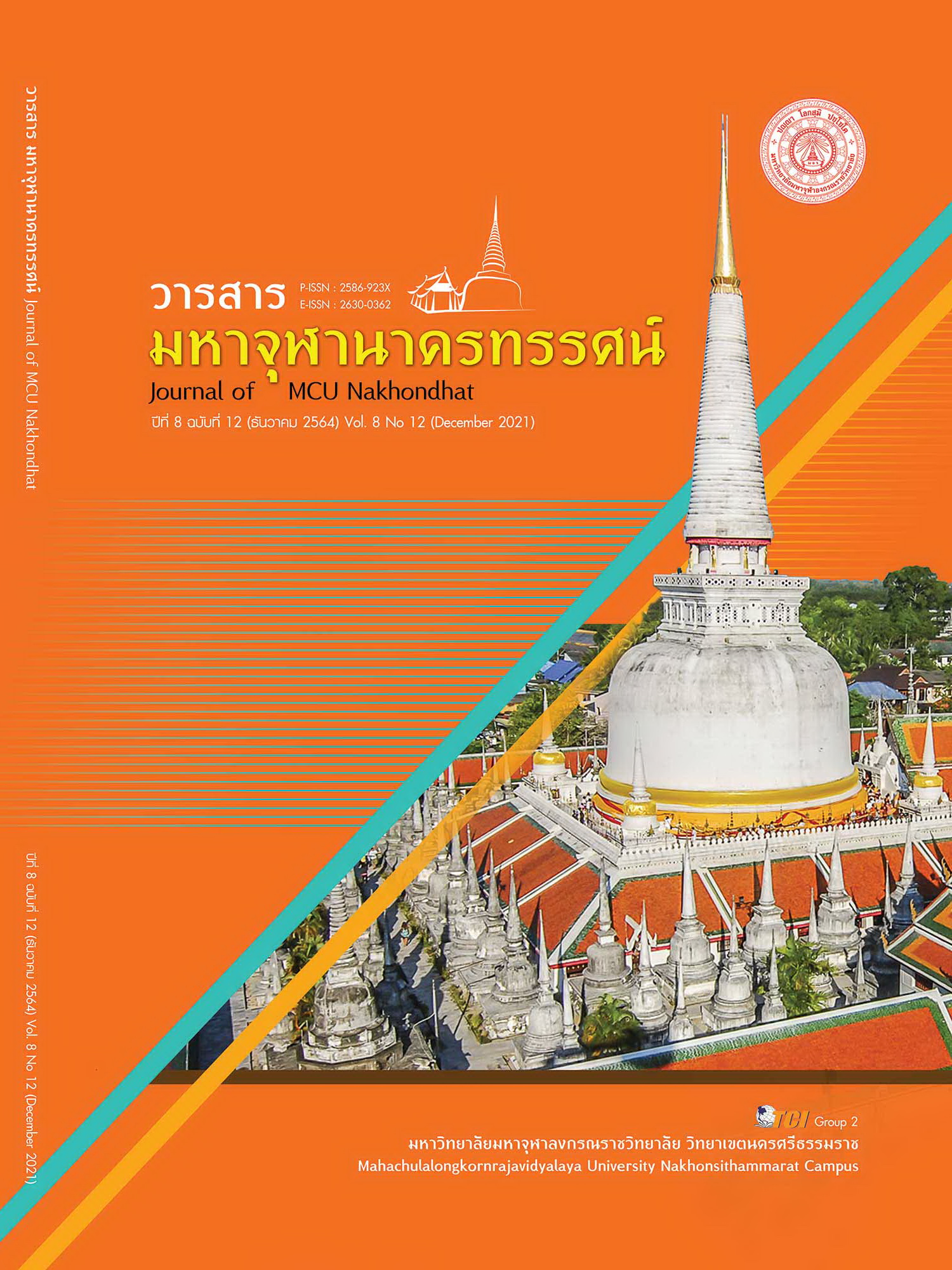POLITICAL CULTURE AND DEMOCRACY DEVELOPMENT IN LOEI PROVINCE
Main Article Content
Abstract
The objectives of the research article were to: 1) study the level of political culture, 2) study the process of political cultural enhancement, and 3) recommend the guidance on political cultural development and democratic development in Loei province. The research was conducted by the mixed method research. The quantitative data were collected from the population of 499,481 persons and 400 samples. The instrument of the research was the questionnaire. The descriptive statistics used for data analysis comprised of frequency, percentage and mean. The qualitative data were analyzed through documents, the in-depth interview of eighteen experts, and focus group discussion of nine purposively selected experts of politics and democracy. The data were analyzed through the content analysis and summarized. The findings of the research were as follows: 1) The political culture and democratic development in Loei province were found to be overall at a high level ( = 38.7); separately considered, all the aspects were found to be at a high level. 2) The process of political cultural enhancement in Loei province consisted of 2.1) trust in democracy, 2.2) commitment in importance and dignity of people, 2.3) respect of democratic rules, 2.4) participation in political activities, 2.5) recognition of civil duties, 2.6) optimism and trust in fellow humans 2.7) recognition of rational and constructive criticism, and 2.8) absence of dictatorship-mindedness and fairness loving. 3) The guidance on development of political culture comprised of 3.1) enhancement of democratic culture in families, 3.2) enhancement of democratic culture in schools, 3.3) enhancement of democratic culture in local communities; the guidance on democratic development in Loei province consisted of 1) participation in the political observation group, 2) representativeness of political groups or parties, 3) political movement, 4) political voluntariness 5) political communication 6) political consciousness, and 7) voting.
Article Details
References
การสนทนากลุ่ม. (10 สิงหาคม 2564). แนวทางการพัฒนาระบอบประชาธิปไตยในจังหวัดเลย. (พระปลัดวสันต์ วสนฺตเวที, ผู้สัมภาษณ์)
การสนทนากลุ่ม ที่1. (10 สิงหาคม 2564). แนวทางการพัฒนาระบอบประชาธิปไตยในจังหวัดเลย. (พระปลัดวสันต์ วสนฺตเวที, ผู้สัมภาษณ์)
ชลิต วงษ์สกุล และคณะ. (2564). การตื่นตัวทางการเมืองในระบอบประชาธิปไตยของประชาชน ในอำเภอหนองฉาง จังหวัดอุทัยธานี. ใน รายงานการวิจัย หลักสูตรบัณฑิตศึกษาภาควิชารัฐศาสตร์ คณะสังคมศาสตร์. มหาวิทยาลัยมหาจุฬาลงกรณราชวิทยาลัย.
ไชยวุฒิ มนตรีรักษ์. (2551). นักการเมืองท้องถิ่นจังหวัดเลย. กรุงเทพมหานคร: สถาบันพระปกเกล้า.
เทศบาลตำบลนาอ้อ 2564. (2564). แผนพัฒนาท้องถิ่นของเทศบาลตำบลนาอ้อ. เรียกใช้เมื่อ 11 มิถุนายน 2563 จาก http://www.tessabannao.go.th/index.php/welcome/
detail/831/menu
บุญเกียรติ การะเวกพันธุ์. (2552). วัฒนธรรมประชาธิปไตย. วารสารวัฒนธรรมไทย, 48(6), 23-25.
เปรมศักดิ์ แก้วมรกฎ. (2561). วัฒนธรรมการมีส่วนร่วมทางการเมืองของวัยร่นุ ในสังคมพหุวัฒนธรรม: กรณีศึกษา อำเภอเทพา จังหวัดสงขลา. ใน วิทยานิพนธ์ศิลปศาสตรมหาบัณฑิต สาขาการเมืองและยุทธศาสตร์การพัฒนา. มหาวิทยาลัยธนบุรี.
ผู้ให้ข้อมูลสำคัญลำดับที่ 1. (10 กรกฎาคม 2564). กระบวนการเสริมสร้างวัฒนธรรมทางการเมืองกับการพัฒนาระบอบประชาธิปไตยในจังหวัดเลย. (พระสิริรัตนเมธี, ผู้สัมภาษณ์)
ผู้ให้ข้อมูลสำคัญลำดับที่ 3. (10 กรกฎาคม 2564). กระบวนการเสริมสร้างวัฒนธรรมทางการเมืองกับการพัฒนาระบอบประชาธิปไตยในจังหวัดเลย. (พระสิริรัตนเมธี, ผู้สัมภาษณ์)
ผู้ให้ข้อมูลสำคัญลำดับที่ 4. (10 กรกฎาคม 2564). กระบวนการเสริมสร้างวัฒนธรรมทางการเมืองกับการพัฒนาระบอบประชาธิปไตยในจังหวัดเลย. (พระสิริรัตนเมธี, ผู้สัมภาษณ์)
ผู้ให้ข้อมูลสำคัญลำดับที่ 5. (11 กรกฎาคม 2564). กระบวนการเสริมสร้างวัฒนธรรมทางการเมืองกับการพัฒนาระบอบประชาธิปไตยในจังหวัดเลย. (พระปลัดวสันต์ วสนฺตเวที, ผู้สัมภาษณ์)
ผู้ให้ข้อมูลสำคัญลำดับที่ 6. (11 กรกฎาคม 2564). กระบวนการเสริมสร้างวัฒนธรรมทางการเมืองกับการพัฒนาระบอบประชาธิปไตยในจังหวัดเลย. (พระปลัดวสันต์ วสนฺตเวที, ผู้สัมภาษณ์)
ผู้ให้ข้อมูลสำคัญลำดับที่ 7. (11 กรกฎาคม 2564). กระบวนการเสริมสร้างวัฒนธรรมทางการเมืองกับการพัฒนาระบอบประชาธิปไตยในจังหวัดเลย. (พระปลัดวสันต์ วสนฺตเวที, ผู้สัมภาษณ์)
ผู้ให้ข้อมูลสำคัญลำดับที่ 8. (11 กรกฎาคม 2564). กระบวนการเสริมสร้างวัฒนธรรมทางการเมืองกับการพัฒนาระบอบประชาธิปไตยในจังหวัดเลย. (พระปลัดวสันต์ วสนฺตเวที, ผู้สัมภาษณ์)
พรอัมรินทร์ พรหมเกิด. (2557). วัฒนธรรมทางการเมืองกับการพัฒนาประชาธิปไตยในเขตชนบทอีสาน: กรณีศึกษาประชาชนในเขตหมู่บ้านคำบง และหมู่บ้านสะอาด ตำบลสะอาด อำเภอน้ำพอง จังหวัดขอนแก่น. วารสารมนุษยศาสตร์สังคมศาสตร์ มหาวิทยาลัยขอนแก่น, 31(3), 63.
มานพ เข็มเมือง และประชัน คะเนวัน. (2559). การมีส่วนร่วมการเลือกตั้งทางการเมืองท้องถิ่นของประชาชนในเขตเทศบาลตำบลหนองแวง อำเภอละหานทราย จังหวัดบุรีรัมย์. วารสารวิชาการ มหาวิทยาลัยราชภัฏบุรีรัมย์, 5(1), 108-124.
เยาวเรศ แตงจวง. (2549). วัฒนธรรมทางการเมืองแบบประชาธิปไตยของนักศึกษามหาวิทยาลัยราชภัฏอุตรดิตถ์. ใน รายงานการวิจัย. มหาวิทยาลัยราชภัฏอุตรดิตถ์.
ศตวรรษ สงกาผัน. (2563). การเปลี่ยนแปลงวัฒนธรรมทางการเมือง และโครงสร้างอำนาจผู้นำในจังหวัดเลย. วารสารปัญญาปณิธาน, 5(2), 123-136.
สถาบันพระปกเกล้า. (2559). ประชาธิปไตยไทยในทศวรรษใหม่. กรุงเทพมหานคร: สถาบันพระปกเกล้า.
สะพรั่ง สุขเวชชวรกิจ. (2561). ธรรมาภิบาลในการเมืองท้องถิ่นของไทย. วารสารรัชตภาคย์, 12(26), 41-65.
สำนักงานคณะกรรมการการเลือกตั้ง. (2562). ข้อมูลสถิติการเลือกตั้งสมาชิกสภาผู้แทนราษฎร พ.ศ. 2562. กรุงเทพมหานคร : สำนักงานคณะกรรมการการเลือกตั้ง.
สำนักงานจังหวัดเลย. (2563). แผนพัฒนาจังหวัดเลย พ.ศ. 2561-2565. [ออนไลน์]. เรียกใช้เมื่อ 11 มิถุนายน 2563 จาก https://ww2.loei.go.th/news_strategy
อมร พิกุลงามโขติ. (2564). การศึกษาวัฒนธรรมทางการเมืองแบบประชาธิปไตยของประชาชนในกรุงเทพมหานคร กรณีศึกษาประชาชนในเขตบางกะปี. วารสารรัชภาคย์, 15(39), 124-136.
อุทัย หิรัญโต. (2525). สารานุกรมศัพท์ทางรัฐศาสตร์. กรุงเทพมหานคร: สำนักพิมพ์โอเดียนสโตร์.
Taro Yamane. (1967). Statistic: An Introductory Analysis. New York: Harpen and Row.
Almond, G.A. & B.G. Powell. (1976). Comparative Political Today. Boston: Little, Brown & Co.
Denzin, at al. (2000). Handbook of Qualitative Research Thousand Oaks. Calif: Sage Publications.
Mehran Kamrava. (1996). Understanding Comparative Politics: a framework for analysis. London and New York: Routledge.
Ronna, C. T. & Laurie, C. (2003). Indexes of item-objective congruence for multidimensional items. Int J Test, 3(2), 163-171.


